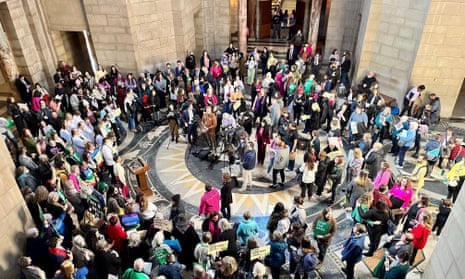On Monday, Jim Pillen, the Republican governor of Nebraska, signed a law that bans abortion after 12 weeks of pregnancy and restricts gender-affirming care for anyone under 19. The ban on trans medical care takes effect in October and the abortion ban goes into effect immediately. And so Nebraska has become the latest state to determine through law what might have once been determined by the more pliable tools of custom or imagination: the way that the sexed body a person is born with shapes the kind of life they can live.
Be it through forced pregnancy or prohibited transition, the state of Nebraska now claims the right to determine what its citizens will do with their sexed bodies – what those bodies will look like, how they will function and what they will mean. It is a part of the right’s ongoing project to roll back the victories of the feminist and gay rights movements, to re-establish the dominance of men in public life, to narrow possibilities for difference and expression and to inscribe in law a firm definition and hierarchy of gender: that people are either men or women and that men are better.
They’re not alone. Abortion bans have been proliferating wildly in the year since the US supreme court eliminated the right in their Dobbs decision, declaring that any state can compel women to remain pregnant, and creating different, lesser entitlements to bodily freedom and self-determination based on sex. But as the abortion bans have spread like an infection across the American south, midwest, and mountain west, they have been accompanied by a related political disease: laws seeking to prohibit minors and sometimes adults, from accessing medical treatments that facilitate gender transitions.
Twenty-five states have enacted pre-viability abortion bans since Roe was overturned last summer, although in some states, like Iowa and Montana, abortion has remained legal pending judicial stays. Meanwhile, 20 states now ban gender-affirming care for minors, with a rush of bills being introduced over the past months. In addition to Nebraska, a slew of states have passed transition-care bans in 2023, including Utah, Mississippi, South Dakota, Iowa, Tennessee and Florida. Texas is soon to join them.
It is not a coincidence that the states which have the most punitive and draconian bans on abortion have also adopted the most aggressive targeting of transgender people and medical care. The bills are part of the same project by conservatives, who have been emboldened in their campaign of gender revanchism in the wake of Dobbs. Both abortion bans and transition care bans further the same goal: to transform the social category of gender into an enforceable legal status, linked to the sexed body at birth and to prescribe a narrow and claustrophobic view of what that gender status must mean.
It is no accident that the states that would forbid a teenager from transitioning are the same that would compel that teenager to give birth; it is no accident that the states with the greatest control over what women do with their reproductive organs are the ones where women’s restrooms have become sites of surveillance and control, with patrons, cis and trans alike, subjected to invasive and degrading inquisitions as to whether they are conforming sufficiently to the demands of femininity. That Nebraska combined these two projects into one bill, then, is less inventive than it is a dropping of pretense: the anti-feminist movement is anti-trans, and the anti-trans panic is at its core anti-feminist.
The attacks on gender freedom from the right are not only united in their ideology, but increasingly in their rhetoric. Abortion and trans rights activists have long insisted that both abortion and transition are healthcare. It’s an apt and worthy argument, considering that both involve the interventions of medical professionals, both facilitate the wellbeing and happiness of those who receive them, and both result in horrific health complications when denied, from the high rates of mental distress and horrific, needless pregnancy complications that have been ushered in by Dobbs, to the dramatic rates of suicidal ideation and mental health problems in trans people who are denied the ability to transition. But increasingly, the right has begun to attack the notion of abortion and trans rights as healthcare, arguing that neither pregnancy nor non-transition constitute “illness”.
At a recent oral argument over the fate of the abortion drug mifepristone, Judge James Ho, a Trump appointee on the fifth circuit court of appeals whose rabidly conservative opinions and trollish affect suggest supreme court ambitions, argued that the drug should be removed from the market in part because “pregnancy is not a serious illness”. “When we celebrate Mother’s Day,” Ho asked, his voice dripping with contempt, “are we celebrating a serious illness?” In that moment, Ho sounded uncannily like anti-trans activists seeking to ban care for young people, who argue, ad nauseam, that “puberty is not a disorder”.
The rhetoric suggests a narrow and myopic view of “health”, the notion that bodies have destinies and should be made to fulfill them regardless of the desires of the people involved. A healthy body, we’re told, is one that conforms to socially imposed gender hierarchies, regardless of how miserable that conformity and imposition makes the people who inhabit those bodies.
But while these practices of abortion and transition care constitute medicine and while their outcomes encourage health, it would be a mistake to fight the political battle for these services only on the ground of what counts as “healthcare”. Because the truth is that conservatives do not care about health – they don’t care about the integrity of the medical profession, or about patient outcomes, or about bodies, not really. They care about people, and about making sure that those people stay in line. In the grand tradition of feminists and queers alike, we should refuse to.
Moira Donegan is a Guardian US columnist











